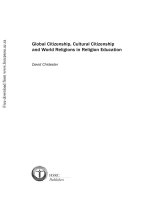GLOBAL RELIGION 2023
Bạn đang xem bản rút gọn của tài liệu. Xem và tải ngay bản đầy đủ của tài liệu tại đây (1.23 MB, 40 trang )
<span class="text_page_counter">Trang 1</span><div class="page_container" data-page="1">
<b>GLOBAL RELIGION 2023</b>
May 2023
A 26-country Global Advisor survey
<b>Religious Beliefs Across the World</b>
<b>Learn more: class="text_page_counter">Trang 2</span><div class="page_container" data-page="2">
© Ipsos | Global Religion 2023 | May 2023 | Public countries surveyed, 40% say they believe in God as described in holy scriptures, 20% believe in a higher spirit but not as described in holy scriptures, another 21% believe in neither God nor any higher spirit, while 19% are not sure or will not say. Majorities in 11 countries believe in God as described in holy scriptures – most notably Brazil, South Africa, Turkey, and India.
In Japan, South Korea, Thailand, and eight of the 10 European countries, no more than half believe in God or a higher power.
Regular attendance at a place of worship and prayer are most prevalent in countries where majorities believe in God or a higher spirit.
The percentage who say that people with religious faith are happier tends to mirror the percentage who say they regularly attend a place of worship.
Belief in heaven averages at 52% and belief in
supernatural spirits (angels, demons, fairies, ghosts, etc.) averages at 49%.
Belief in hell and in the devil both average about 10 points lower than belief in heaven.
The percentage of believers in each of heaven, spirits, hell, and the devil is lowest in Belgium and tends to be 50-60 points higher in Turkey, Brazil, and South Africa.
About three in four believers in God or a higher power say it helps them to overcome crises, gives meaning to their life, and makes them happier than average. The higher the proportion of believers in a country, the more likely believers are to feel they benefit from their faith.
Comfort with being around people of different religious beliefs averages 76%. It is highest in South Africa, Singapore, and the Anglosphere, and lowest in Germany, Japan, and South Korea (where religiosity is lowest).
Nearly half (47%) say religion does more harm in the world than good. After India, this view is most common in Western Europe and in Japan where it has grown widely since 2017; it is least common in Latin America, South Africa, Turkey, and Southeast Asia.
On average, 42% say their religion defines them as a person. All three countries where more than three in four agree are predominantly non-Christian; all six
countries where less than one in three agree are in Europe.
<b>Religion and morality</b>
On average, 54% agree that religious practices are an important factor in the moral life of citizens, 37% agree that people with religious faith are better citizens, and 20% say they lose respect for people when they find out they are not religious. In all three cases, the percentages vary by as much as 50 or 60 points between countries with high and low levels of religiosity.
<b>Wide generation gaps</b>
In most countries surveyed, younger people are less likely to identify as Christian (especially Catholic) and more likely to identify as Muslim or of some other faith compared to older people in their country. In each one the 16 most Catholic countries surveyed, the percentage of Gen Zers who identify as Catholic is lower than the percentage of Boomers who do so – by an average of 16 points. A similar generation gap exists in nearly every country where a large proportion of all adults identify as Protestant, Evangelical or just “Christian”. Conversely, wherever at least 2% of all adults identify as Muslim, Gen Zers are more likely than Boomers to do so – by an average of 7 points. These demographic shifts likely account for generational differences in beliefs, practice, and attitudes toward religion, which vary depending on the country’s religiosity and immigration patterns.
In nearly all countries where at least one-third of all adults believe in God as described in holy scriptures, Gen Zers are less likely than Boomers to hold such beliefs, whereas the trend is reversed in less religious countries. Similarly, in countries where religious practice is high, older adults tend to engage in it more than the young, while in countries where religious practice is low, young people tend to have higher engagement.
In countries where young people are more likely than older adults to identify as Muslim, they are also more likely to be religious, to view their religion as a marker of their identity, and to associate religion with morality. Also, the younger people are, the more likely they are to believe in heaven, hell, the Devil and supernatural spirits.
</div><span class="text_page_counter">Trang 3</span><div class="page_container" data-page="3"><b>DENOMINATION,PRAYER AND </b>
<b>WORSHIP </b>
<b>FREQUENCY</b>
</div><span class="text_page_counter">Trang 4</span><div class="page_container" data-page="4">© Ipsos | Global Religion 2023 | May 2023 | Public Global average
Base: 19,731 online adults under the age of 75 across 26 countries, interviewed Jan. 20, 2023 – Feb. 3, 2023.
The “26-country average” reflects the average result for all the countries where the survey was conducted. It has not been adjusted to the population size of each country or market and is not intended to suggest a total result. The samples in Brazil, Chile, Colombia, India, Mexico, Peru, Singapore, South Africa, Thailand, and Turkey are more urban, educated, and/or more affluent than the general population.
Christian - Protestant or Evangelical (e.g., Anglican, Baptist,
</div><span class="text_page_counter">Trang 5</span><div class="page_container" data-page="5">Global average
<b>Religion identification by country</b>
Base: 19,731 online adults under the age of 75 across 26 countries, interviewed Jan. 20, 2023 – Feb. 3, 2023.
Any other religion (Net)
Prefer not to say
</div><span class="text_page_counter">Trang 6</span><div class="page_container" data-page="6">© Ipsos | Global Religion 2023 | May 2023 | Public Global average
<b>Religion identification: 26-country average by gender and generation</b>
Base: 19,731 online adults under the age of 75 across 26 countries, interviewed Jan. 20, 2023 – Feb. 3, 2023.
The “26-country average” reflects the average result for all the countries where the survey was conducted. It has not been adjusted to the population size of each country or market and is not intended to suggest a total result. The samples in Brazil, Chile, Colombia, India, Mexico, Peru, Singapore, South Africa, Thailand, and Turkey are more urban, educated, and/or more affluent than the general population.
</div><span class="text_page_counter">Trang 7</span><div class="page_container" data-page="7">Global average
<b>Religious identification: Generation gap by country (Catholic and Protestant/Evangelical+)</b>
Base: 19,731 online adults under the age of 75 across 26 countries, interviewed Jan. 20, 2023 – Feb. 3, 2023.
<i>Q. What is your religion?</i>
</div><span class="text_page_counter">Trang 8</span><div class="page_container" data-page="8">© Ipsos | Global Religion 2023 | May 2023 | Public Global average
<b>Religious identification: Generation gap by country (Muslim, Buddhist, Hindu)</b>
Base: 19,731 online adults under the age of 75 across 26 countries, interviewed Jan. 20, 2023 – Feb. 3, 2023.
The “26-country average” reflects the average result for all the countries where the survey was conducted. It has not been adjusted to the population size of each country or market and is not intended to suggest a total result. The samples in Brazil, Chile, Colombia, India, Mexico, Peru, Singapore, South Africa, Thailand, and Turkey are more urban, educated, and/or more affluent than the general population.
<i>% among Gen Z minus % among Boomers</i>
<b>Muslim (Top 14 countries surveyed)</b>
</div><span class="text_page_counter">Trang 9</span><div class="page_container" data-page="9"><b>Religious identification: Generation gap by country (No religion and Prefer not to say)</b>
Base: 19,731 online adults under the age of 75 across 26 countries, interviewed Jan. 20, 2023 – Feb. 3, 2023.
<i>Q. What is your religion?</i>
<b>Gen Z skew</b>
<i>% among Gen Z minus % among Boomers</i>
<b>No religion (atheist, agnostic or spiritual)</b>
</div><span class="text_page_counter">Trang 10</span><div class="page_container" data-page="10">© Ipsos | Global Religion 2023 | May 2023 | Public Global average
Base: 19,731 online adults under the age of 75 across 26 countries, interviewed Jan. 20, 2023 – Feb. 3, 2023.
The “26-country average” reflects the average result for all the countries where the survey was conducted. It has not been adjusted to the population size of each country or market and is not intended to suggest a total result. The samples in Brazil, Chile, Colombia, India, Mexico, Peru, Singapore, South Africa, Thailand, and Turkey are more urban, educated, and/or more affluent than the general population.
<b>Religious practice by country</b>
<b>% Once a month or more often</b>
<i>Q. On average, how often do you do the following?</i>
<i>“Go to a place of worship (e.g., a church, temple, or mosque)”</i>
</div><span class="text_page_counter">Trang 11</span><div class="page_container" data-page="11"><b>Religious practice by country: Generation gap by country</b>
Base: 19,731 online adults under the age of 75 across 26 countries, interviewed Jan. 20, 2023 – Feb. 3, 2023.
<i>% among Gen Z minus % among Boomers</i>
<b>Pray outside a place of worship</b>
</div><span class="text_page_counter">Trang 12</span><div class="page_container" data-page="12">© Ipsos | Global Religion 2023 | May 2023 | Public
12‒
</div><span class="text_page_counter">Trang 13</span><div class="page_container" data-page="13">Global average
Base: 19,731 online adults under the age of 75 across 26 countries, interviewed Jan. 20, 2023 – Feb. 3, 2023.
<b>Belief in God or a higher power: 26-country average</b>
<b>I believe in God </b>as described in holy scriptures (e.g., the Bible, the Quran, the Torah, etc.)
<b>I believe in a higher power or spirit</b>, but not in God as described in holy scriptures
<b>I do not believe </b>in God or in a higher power or spirit of any kind
Not sure
Prefer not to say
</div><span class="text_page_counter">Trang 14</span><div class="page_container" data-page="14">© Ipsos | Global Religion 2023 | May 2023 | Public Global average
<b>Belief in God or a higher power by country</b>
Base: 19,731 online adults under the age of 75 across 26 countries, interviewed Jan. 20, 2023 – Feb. 3, 2023.
The “26-country average” reflects the average result for all the countries where the survey was conducted. It has not been adjusted to the population size of each country or market and is not intended to suggest a total result. The samples in Brazil, Chile, Colombia, India, Mexico, Peru, Singapore, South Africa, Thailand, and Turkey are more urban, educated, and/or more affluent than the general population.
described in holy scriptures (e.g., the Bible, the Quran, the Torah, etc.)
I believe in a higher power or spirit, but not in God as described in holy scriptures
Prefer not to say
Not sure
I do not believe in God orin a higher power or spirit
</div><span class="text_page_counter">Trang 15</span><div class="page_container" data-page="15">Global average
<b>Belief in God or a higher power by demographics (global average)</b>
Base: 19,731 online adults under the age of 75 across 26 countries, interviewed Jan. 20, 2023 – Feb. 3, 2023.
described in holy scriptures (e.g., the Bible, the Quran, the Torah, etc.)
I believe in a higher power or spirit, but not in God as described in holy scriptures
Prefer not to say
Not sure
I do not believe in God orin a higher power or spirit
</div><span class="text_page_counter">Trang 16</span><div class="page_container" data-page="16">© Ipsos | Global Religion 2023 | May 2023 | Public Global average
<b>Belief in God or a higher power by demographics (global average)</b>
Base: 19,731 online adults under the age of 75 across 26 countries, interviewed Jan. 20, 2023 – Feb. 3, 2023.
The “26-country average” reflects the average result for all the countries where the survey was conducted. It has not been adjusted to the population size of each country or market and is not intended to suggest a total result. The samples in Brazil, Chile, Colombia, India, Mexico, Peru, Singapore, South Africa, Thailand, and Turkey are more urban, educated, and/or more affluent than the general population.
<b>% Believe in God as </b>
<b>described in holy scriptures (e.g., the Bible, the Quran, the Torah, etc.)</b> countries where more than 1/3 of all adults believe in God: -10
Average across 12 countries where less than 1/3 of all adults believe in God: +5
</div><span class="text_page_counter">Trang 17</span><div class="page_container" data-page="17">Global average
Base: 19,731 online adults under the age of 75 across 26 countries, interviewed Jan. 20, 2023 – Feb. 3, 2023.
<b>Religious beliefs: 26-country average</b>
<i>Q. Do you believe each of the following exist(s)?</i> (e.g., angels, demons, fairies, ghosts, etc.)
The Devil
</div><span class="text_page_counter">Trang 18</span><div class="page_container" data-page="18">© Ipsos | Global Religion 2023 | May 2023 | Public
<b>Religious beliefs: Generation gap (Gen Z vs. Boomers)</b>
Base: 19,731 online adults under the age of 75 across 26 countries, interviewed Jan. 20, 2023 – Feb. 3, 2023.
The “26-country average” reflects the average result for all the countries where the survey was conducted. It has not been adjusted to the population size of each country or market and is not intended to suggest a total result. The samples in Brazil, Chile, Colombia, India, Mexico, Peru, Singapore, South Africa, Thailand, and Turkey are more urban, educated, and/or more affluent than the general population.
<i>Q. Do you believe each of the following exist?</i>
Sweden, Hungary, France, Great Britain,
Japan, Turkey, Belgium, Germany<sup>South Africa</sup>
Sweden, Argentina, Mexico, Turkey,
Australia, Germany, Canada, Japan, Great Britain
Hungary, Germany, Sweden, Turkey, Belgium, France, Great Britain, Thailand, Singapore, Netherlands
South Africa
Sweden, Germany, Turkey, Great Britain,
Hungary, Canada, Netherlands, France<sup>India</sup>
</div><span class="text_page_counter">Trang 20</span><div class="page_container" data-page="20">© Ipsos | Global Religion 2023 | May 2023 | Public Global average
Base: 19,731 online adults under the age of 75 across 26 countries, interviewed Jan. 20, 2023 – Feb. 3, 2023.
The “26-country average” reflects the average result for all the countries where the survey was conducted. It has not been adjusted to the population size of each country or market and is not intended to suggest a total result. The samples in Brazil, Chile, Colombia, India, Mexico, Peru, Singapore, South Africa, Thailand, and Turkey are more urban, educated, and/or more affluent than the general population.
<b>% Yes</b>
<i>Q. Do you believe each of the following exist(s)?</i>
<i>“Supernatural spirits (e.g., angels, demons, fairies, ghosts, etc.)”</i>
</div><span class="text_page_counter">Trang 22</span><div class="page_container" data-page="22">© Ipsos | Global Religion 2023 | May 2023 | Public Global average
Base: 19,731 online adults under the age of 75 across 26 countries, interviewed Jan. 20, 2023 – Feb. 3, 2023.
The “26-country average” reflects the average result for all the countries where the survey was conducted. It has not been adjusted to the population size of each country or market and is not intended to suggest a total result. The samples in Brazil, Chile, Colombia, India, Mexico, Peru, Singapore, South Africa, Thailand, and Turkey are more urban, educated, and/or more affluent than the general population.
</div><span class="text_page_counter">Trang 23</span><div class="page_container" data-page="23"><b>ROLE OF BELIEFIN GOD OR A </b>
<b>HIGHER POWER </b>
</div><span class="text_page_counter">Trang 24</span><div class="page_container" data-page="24">© Ipsos | Global Religion 2023 | May 2023 | Public Global average
Base: 12.066 online adults who believe in God or a higher power under the age of 75 across 26 countries, interviewed Jan. 20, 2023 – Feb. 3, 2023.
The “26-country average” reflects the average result for all the countries where the survey was conducted. It has not been adjusted to the population size of each country or market and is not intended to suggest a total result. The samples in Brazil, Chile, Colombia, India, Mexico, Peru, Singapore, South Africa, Thailand, and Turkey are more urban, educated, and/or more affluent than the general population.
<b>Role of belief in God or a higher power: 26-country average </b>
<i>Q. How much do you agree or disagree with the following statements?</i>
Believing in God or higher forces allows me to overcome crises (illness, conflicts, disasters, etc.)
Believing in God or higher forces gives meaning to my life
Believing in God or higher forces makes me happier than average
<i>Base: Believe in God or a higher power/spirit</i>
</div><span class="text_page_counter">Trang 25</span><div class="page_container" data-page="25">Global average
Base: 12.066 online adults who believe in God or a higher power under the age of 75 across 26 countries, interviewed Jan. 20, 2023 – Feb. 3, 2023.









